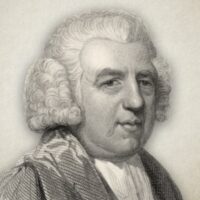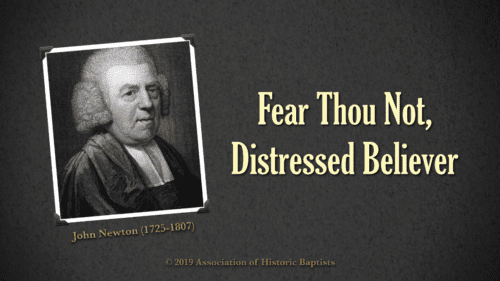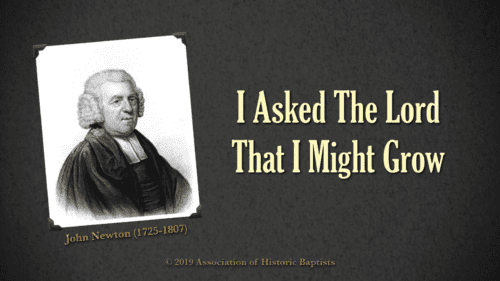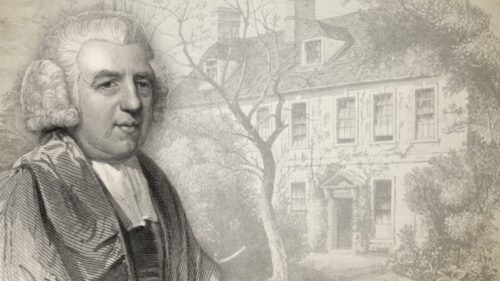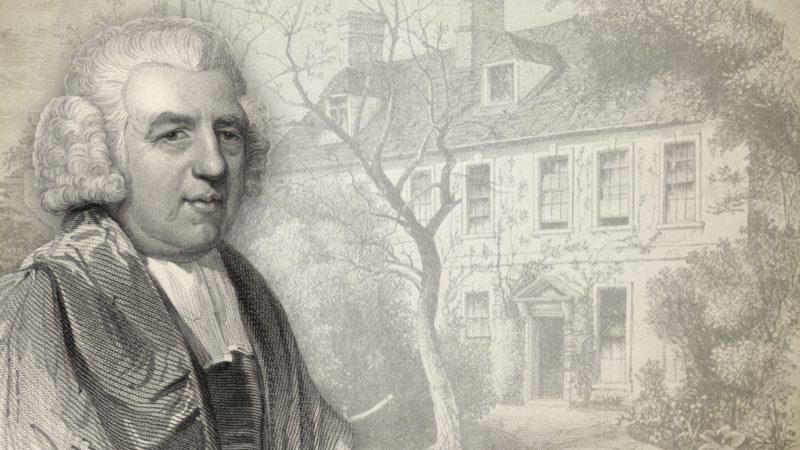
John Newton’s Study
The Sower 1896:
The accompanying illustration represents John Newton’s study in Olney Vicarage, which is now much as it was more than a century ago, when he resided there for sixteen years, from I764. The Vicarage was rebuilt and enlarged for him by Lord Dartmouth, and he entered upon this new abode in October, 1767. His reflections upon the occasion are as follow:—
“I am desirous to set this apart as a day of solemn prayer, to ask the Lord to afford us His gracious presence in our new habitation, and I desire to humble myself before Him for my faint sense and poor improvement of all His mercies, and to make a new surrender of myself and my all to His service. I am a poor wretch that once wandered naked and barefoot, without a home, without a friend; and now for me who once used to lie on the ground and was treated as a dog by all around me, Thou hast prepared a house suitable to the connection Thou hast put me into.”
He had painted on a panel over the mantelpiece the two Scriptures: “Since thou wast precious in My sight, thou hast been honourable” (Isaiah 43:4). But! “Thou shalt remember that thou wast a bondman in the land of Egypt, and the Lord thy God redeemed thee” (Deut. 15:15).
It is an attic on the third floor with a dormer window, and notwithstanding the many changes that have taken place in the occupants of the house during so long a period, this valuable memento of such an honourable and justly esteemed servant of the Lord has been allowed to remain, and bears its silent witness to the power and effects of God’s free grace, mercy, and love. The good man evidently wished to keep in mind the two conditions set forth in those two portions of God’s Word. Not only to remember what he now was by and through the grace of God, to what an exalted position he had thereby been raised, and that Jesus Christ had claimed him as His own, a son of God and a servant of the Lord Jesus Christ, and that now he was beheld in Christ blameless, without spot or wrinkle, or any other such thing, dear and precious in the sight of God. Yet as the Apostle says, “Lest he should be exalted above measure” in the knowledge and experience of these things—But! but!—“thou shalt remember that thou wast a bondman in the land of Egypt.” “Look unto the hole of the pit whence ye were digged, and to the rock whence ye are hewn.” “Jacob’s acknowledgment, with a little variation, becomes me,” he said, for “with my staff I came over Jordan, and now I am become two bands.” What a wretch was I in Africa! And how is it with me now? It is one of the greatest wonders that such a wretch, such a demoniac as I once was, should be capable of feeling so strong an attachment to the Lord’s people. Well may I say, ‘What hath God wrought’!
“Thy people wonder when they see
A wretch like me restored,
And point and say, ‘How changed is he
Who once defied the Lord.’
“In my late illness I was enabled to see and to feel that I was not my own, that He had bought me with His blood, has a right to dispose of me and to say, ‘Go here,’ or ‘sit there,’ as He sees best; and further, that His sovereign authority is combined with infinite mercy, and that He has promised to choose and manage far better for me than I could choose for myself, if permitted. I aimed, and still aim, to say from my heart, ‘What, when and how Thou wilt.’ My sins and follies banished me to the house of bondage in Africa, where I was the scorn and pity of slaves. From thence He redeemed me when I knew Him not, when I defied Him. He has since given me a name and a place among His children. My case is almost as singular as Jonah’s. He was the only one delivered, after having been entombed in the belly of the fish, and I, perhaps, am the only one ever brought from bondage and misery in Africa to preach Jesus Christ and Him crucified. ‘Oh, magnify the Lord with me, and let us exalt His name together’! I wish to be more thankful for what the Lord has been to me, but I long to rise a step higher still, to be enabled to contemplate His character as displayed by the cross of Christ, so that I may continually admire and adore Him for what He is in Himself. He would have been great and glorious, wise, powerful, holy, and gracious, though I had never been brought into existence, or had been left to perish as I deserved. There would have been a redeemed company though I had never known Him. Here I would so fix my eyes and thoughts as in a manner to forget myself; and then, when my heart was overwhelmed as it were with His majesty, combined with mercy, His glory shining in grace, to bring the matter home, and say, with gratitude and triumph, ‘This God’—this great and wonderful God—‘is our God’! Yea, is my God!”
On taking up his abode at Olney, when he had preached six sermons, he thought he had told them his whole stock, and was considerably depressed thereby; but, walking one afternoon by the side of the river Ouse, he says: “I asked myself, How long has this river run? Many hundred years before I was born, and will certainly run on many years after I am gone. Who supplies the fountain from whence this river comes? God. Is not the fund of my sermons equally inexhaustible? The Word of God? Yes, surely, I have never been afraid of running out since that time.”
Writing from Olney to Mrs. L———, he says: “I seem not cut out for a London situation, and have therefore reason to be thankful that my lot is cast in a retired corner; and though I am glad occasionally to see my friend, yet I am glad to get back out of the noise, smoke, and bustle. However, the path of duty, lead where it will, is always safe, provided we are aware of danger, and are dependent upon the Lord to keep us. He is all-sufficient to His people in every place and circumstance. His presence can make a dungeon pleasant, and without it a palace would prove a dungeon to a soul that has tasted He is gracious. I am surrounded here by the poor lace-makers, and see much of poverty. Most of our serious people are exercised with it; some have little more than bread; some, who are slow workers or used to coarse laces, can hardly get so much as bread without contracting debts, which distresses them. The Lord, notwithstanding, carries them through, and at times gives them meat which the world knows not of. By being placed among such a people, I hope the Lord shows me that I have great reason to be thankful for the necessaries and comforts of life.”
Mr. Newton was seldom without guests at the Vicarage, being encouraged and aided by his friend, Mr. John Thornton, “to be hospitable and keep an open house for such as are worthy of entertainment, help the poor and needy, I will statedly allow you £200 a year, and readily send whenever you have occasion to draw for more”; and considering the condition of many of his flock, there was ample scope for this liberality, which doubtless proved a very great blessing to them. He established cottage prayer meetings, and frequently in his excursions about Olney and the neighbouring villagee, would meet a few poor women, read the Word of God to, and pray with them, and then proceed on his journey. By the kind permission of Lord Dartmouth, he used the Great House, an unoccupied mansion for the same purpose, and exposition of the Scriptures, where himself, with his friends, ”Bull,” of Newport Pagnell, John Berridge, Rowland Hill, Joshua Symonds, of the Banyan Meeting, Bedford, and others, as often as he could get them there, gave addresses, singing the Olney hymns, many of which were composed specially for these occasions. On the re-opening of this house for prayer by the river side, the two following hymns were composed; one by John Newton, beginning—
“O Lord, our languid souls inspire,
For here we trust Thou art;
Send down a coal of heavenly fire
To warm each waiting heart,” &c.;
the other by Cowper, beginning—
“Jesus, where’er Thy people meet,
There they behold Thy mercy-seat;
Where’er they seek Thee, Thou art found,
And every place is hallowed ground,” &c.
Cowper here joined with the humble worshippers, pouring forth his heart before God in earnest supplication, with a devotion equally simple and fervent.
Mr. Newton’s diary has this record:
“Tuesday.—Drank tea at Mr. Drake’s, minister of the chapel at Olney. Preached at the Great House, from Heb. 2:18, “For in that He Himself hath suffered being tempted, He is able to succour them that are tempted,” to which I was led by Mr. Cowper’s prayer.”
“Friday.—Went to meet the little society at Molly Mole’s cottage. The Lord has been pleased to awaken several young persons of late, and to incline their hearts to meet together,”
A list of names exists of those who took part in these hallowed and soul-strengthening seasons. Amongst others are these—R. Stamford Chater; Hull; Jones, Curate of Olifton; Trinder, of Northampton, Kaye, &c., &c.
Mr. Newton was very plain and practical in his addresses, preaching only Jesus Christ as the Saviour of sinners, which he had been led to from the following circumstance coming to his knowledge before he went to Olney. A friend of his was desired to visit a woman in prison. He was informed of her evil habit of life, and therefore spoke strongly of the terrors of the Lord and the curses of the law. She heard him awhile, and then laughed in his face. Upon this he changed his note, and spoke of the Saviour, of what He had done and suffered for sinners. He had not talked long in this strain before he saw a tear or two in her eyes. At length she interrupted him by saying, “Why, sir, do you think there can be any hope of mercy for me?” He answered, “Yes, if you feel your need of it, and are willing to seek it in God’s appointed way, I am sure it is as free for you as for myself.” She replied, “Ah! if I had thought so, I should not have been in this prison. I long since settled it in my mind that I was utterly lost, that I had sinned beyond all possibility of forgiveness, and that made me desperate.” He visited her several times, and when she went away (for she was transported) he had good reason to believe she was truly converted. Christ crucified is the wisdom and the power of God.
In this study he composed many of his hymns, 280 in number, which, with those of his friend Cowper, form the well-known and much-valued “Olney Hymns.” Can we not imagine him looking up at those two scriptures, and then writing—
“Amazing grace (how sweet the sound)
That saved a wretch like me!
I once was lost, but now am found;
Was blind, but now I see,”—(Hymn 41, Book I.)
“How sweet the name of Jeeus sounds
In a believer’s ear;
It soothes his sorrow, heals his wounds,
And drives away his fear.”—(Hymn 57, Book I.)
“The saints Emmanuel’s portion are,
Redeemed by price, reclaimed by power;
His special choice and tender care,
Owns them and guards them every hour.
“He finds them in a barren land,
Beset with sins and fears and woes;
He leads and guides them by His hand,
And bears them safe from all their foes.”—(Hymn 99, Book III.)
The letters also, comprising two other of his most valued works, “Omicron” and “Carcliphonia,” were written during his residence in this home. Mr. Cowper helped him to the title-page of the last named, which ran as follows: “Cardiphonia; or, the Utterances of the Heart. In a Collection of Letters written in the course of a real Correspondence on a variety of Religious Subjects. By Omicron, ‘As in water face answereth to face, so the heart of man to man’ (Prov. 27:19).”
After leaving Olney, Mr. Newton thus writes to one of his successors at the Vicarage:—“Methinks I see you sitting in my old corner in the study. I will warn you of one thing—that room (do not start) used to be haunted. I cannot say I ever saw or heard anything with my bodily organs, but I have been sure there were evil spirits in it, and very near me—a spirit of folly, a spirit of indolence, a spirit of unbelief, and many others—indeed, their name is legion. But why should I say they are in your study, when they followed me to London, and still pester me here?”
A most endeared friendship existed between Mr. Newton and Mr. Cowper during the residence at Olney, and on one occasion, while suffering from his well-known malady, Mr. Cowper, with Mrs. Unwin, resided fourteen months, in 1773-4, in Mr. Newton’s house, so that we do not wonder at his writing thus after Mr. Newton had left it: “The Vicarage House became a melancholy object as soon as Mr. Newton left it. As I walked in the garden this evening, I saw the smoke issue from the study chimney, and said to myself, ‘That used to be the sign that Mr. Newton was there,’ but it is so no longer.”
During a visit to Olney many years after his removal to London, being in this little Bethel spot, he says: “The texts over the fireplace are looking at me in the face while I write. A thousand thoughts crowd upon me–what I have seen, what I have known of the Lord’s goodness, and of my own evil heart, what sorrow, and what comforts in this house! All is now past; the remembrance only remains, as of a dream when we awake. Ere long we shall have done with changes.”
John Newton (1725-1807) was an English Anglican preacher, hymn writer and humanitarian. Prior to faith in Christ, he served as the captain of slave ships and made a living in the slave trade. After his conversion to Christ, he renounced slavery and became one of the leading abolitionists in England. He was ordained a cleric in the Church of England serving as parish priest at Olney, Buckinghamshire, for twenty years. Among Evangelical circles, he is best known for his hymns, among which are “Glorious Things Of Thee Are Spoken” and “Amazing Grace”.
John Newton Hymn Studies



